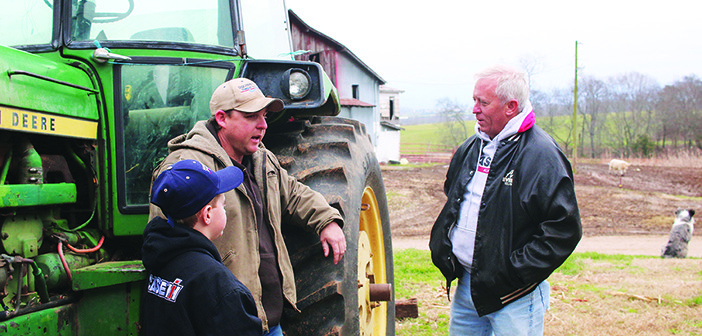By Jeff Keeling
Jeff Aiken stood outside a barn at his Bowmantown farm in the crisp December air Friday, one of his most crucial tools in hand. Unlike many of the important implements in his agricultural career to date, this one won’t show its usefulness through a weathered combination of grease, dirt and feed.
In fact, exposure to any of those ubiquitous elements of farm life would spell big trouble for Aiken’s smart phone – and that, in turn, would put the recently elected president of the Tennessee Farm Bureau (TFB) in at least a temporary pickle.
Though he’ll miss being around the 900 acres he works with two brothers and a nephew, Aiken said last week he is “humbled and honored” at the chance to lead the largest Farm Bureau in the nation. Aiken, who had been vice president of the organization since 2012, was elected without opposition at the organization’s annual convention in Franklin earlier this month. The 52-year-old replaces Lacy Upchurch, a Cumberland County farmer who had served five two-year terms as president.
Aiken, a 1981 Daniel Boone High School graduate, said farmers – who experienced an interesting year weather-wise and were hit hard locally by plummeting prices for beef cattle – face important issues on a number of fronts.
While he can’t do anything about commodity prices or weather, Aiken said the TFB, which represents about 644,000 family members statewide, is a critical resource for promoting and protecting the interests of farmers and rural communities, both at the state and national level.
“It’s a demanding position with a lot of travel, but my love for agriculture and the rural areas of the state of Tennessee caused me to think it’s just an opportunity that if I had it, I couldn’t pass it up,” Aiken said. “I like Washington County and I like the farm, so I hope to make it home as often as possible – at least on weekends.”
Aiken, who was Tennessee’s young farmer of the year in 1992, will be joined in Nashville by his wife Carol. “I need her for moral support,” he said with a grin, before showing evidence of the job’s demands on his phone screen – a number on the icon for his email app showing he had more than 700 emails to sift through, with less than two hours to go before the “weekend” officially started.
“There’s a lot of stuff to think about and consider,” said Aiken, who had completed American Farm Bureau Federation training for new state presidents in Washington, D.C. earlier in the week. “I’m a little overwhelmed, just to be honest with you. It’s a major change of lifestyle already, but I am also enjoying and looking forward to the challenges and the opportunities.”
Legislation, regulation and bureaucracy are among the crops to which Aiken must tend now that he has become the eighth president in TFB’s 94-year history. At its convention, the organization took positions on several key issues on which Aiken, as its leader, will press for favorable legislative or governmental action.
One is related to that important tool Aiken always has close at hand.
“There are a lot of rural areas that don’t have access to reliable, dependable and affordable broadband,” he said. “It puts agricultural and rural communities at a disadvantage, and that’s one that will be worked on.”
He said the TFB also will advocate to prevent a bill that passed the state Senate last year and was held up in the house, which would allow weight limits on county roads. That’s something Aiken said could affect farmers’ and loggers’ ability to get products in to their farms or deliver to market.
Underscoring transportation’s importance to agriculture, the bureau also settled on language regarding a state gasoline or fuel tax increase. It was a change in position, Aiken said.
“We could support a fiscally responsible state fuel tax increase, if and only if the money that was taken out of the funds under the Bredesen administration were first returned to the fund, and as long as the monies collected would go toward building and maintenance of roads and bridges in the state and nothing else.”
Between fiscal 2002 and fiscal 2007, a total of $280 million in revenues generated from the state’s 21.4-cent-per-gallon gasoline tax (18.4 cents for diesel) was transferred from the state’s highway fund to the general fund.
On an issue that affects





